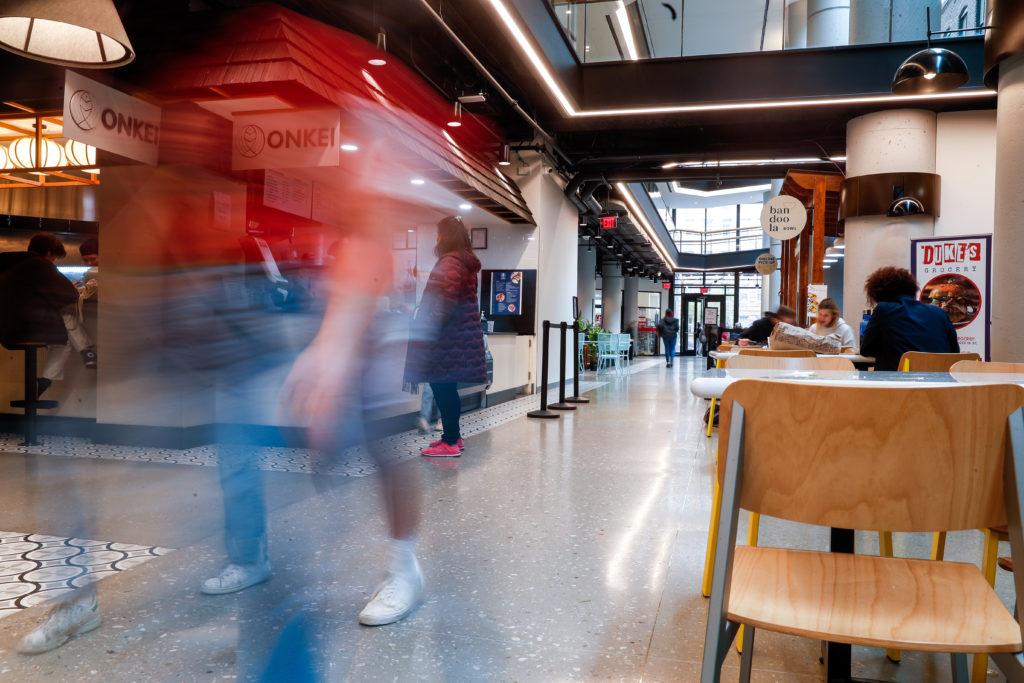Employees at local businesses said fewer students are dining at GWorld vendors after officials converted most undergraduate students to a swipe-based dining plan in January.
Employees at 10 restaurants said they are now more reliant on the business of nonstudent customers, like nearby office workers, after noticing a steep drop in GWorld payments at their restaurants following the University’s transition to a primarily swipe-based, dining hall meal plan which allotted students fewer funds to spend at local businesses. Workers at a dozen GWorld vendors said GW did not notify them of their plans to give students fewer dining dollars prior to the switch, causing management to brainstorm last-minute ways to grow their student customer base, like student discounts.
University spokesperson Julia Metjian said GW believes the decision to move to the dining hall model is “more beneficial” to students because it helps build community, “addresses” food insecurity and helps students access “quality, affordable” food. Officials announced plans to transition the University’s dining system to a more dining hall-centric format in 2021 – initially planning to construct all-you-can-eat dining halls in Thurston and Shenkman halls and District House – but pushed back the halls’ opening for months and opted for a traditional vendor format in District because of supply chain issues.
“Off-campus partners will continue to be a central component of the meal plan for years to come through the declining balance portion of the meal plans,” Metjian said in an email.
Officials reduced the number of dining dollars most students can spend at partnering restaurants at the start of spring semester by at least $1,000, coinciding with the Shenkman Hall dining hall opening – the final stage of GW’s dining transformation. Officials will officially discontinue the University’s legacy dining plan next fall, which provided $1,670 in dining funds to use at partnering businesses, and instead, offer five plans with varying numbers of meal swipes to use at the University’s dining halls and a reduction in dining dollars compared to the legacy plan.
Metjian declined to comment on if officials notified local businesses of their plans to reduce students’ dining dollars and if they had heard concerns about the move’s effect on local businesses from community members.
Starting in the fall, the University will offer meal plans with unlimited swipes and $200 dining dollars to spend at GWorld vendors for students of all grade levels while sophomores through seniors are eligible for a plan with 85 days of unlimited meal swipes and $800 dining dollars. Officials are also offering juniors and seniors three plans with 90, 120 and 175 meal swipes and $890, $600 and $400 dining dollars, respectively.
Luis Reyes – the general manager at Roti, a Mediterranean restaurant wedged between Sweetgreen and Residences on the Avenue apartments on I Street – said he noticed a drop in students paying with GWorld since January, estimating that students currently account for 10 percent of customers, lower than the approximate 25 percent of its total clientele prior to the transition.
Reyes said he spoke with Roti corporate about offering GW students “combo meals” or discounts to be “proactive” in restoring their student customer base following the drop in January. But he added that he is not too concerned about Roti’s business because the Mediterranean chain also receives customers from GW Hospital and nearby offices.
“Having the extra boost always helps,” Reyes said. “We were concerned, and that’s something we were talking about with headquarters to see what we can do about it.”
Philip Fromyer, the beverage director and acting co-manager at Tigerella in Western Market, said while Tigerella does not receive a large number of student customers, employees have seen a drop from 226 GWorld payments in December to 63 since the beginning of 2023.
Tigerella shut down the cafe portion in January because of a lack of business stemming from its proximity to other coffee shops nearby, but the restaurant side of the property remains open. Bullfrog Bagels moved into the cafe space in March.
Fromyer said the University never notified Tigerella about its transition away from the GWorld-focused meal plan.
“Getting everything set up for GWorld took us a while, so you would think that they would send a message out to the vendors as well,” Fromyer said.
Faruk Mohammed, owner of CharmThai and Flavors of India, said students now comprise about 20 percent of their business, a drop from 60 percent of their customers prior to January. He said he’s noticed a decrease in student customers at both restaurants but is not worried about business because the restaurant receives a lot of locals.
“We still have a lot of customers, just not as many students as before,” Mohammed said.
William Bong, a co-owner of Onkei in Western Market, said he noticed a drop in students as well, but the change is not affecting the state of Onkei’s business. He said their clientele is currently about 70 percent employees from surrounding offices and 30 percent students – a reversal from 30 percent office worker and 70 percent student clientele before January.
“We are still surviving here,” Bong said. “We would like to get more business from students, of course, but as of right now, we’re doing okay, there’s no complaints.”
Matthew Brooks, a cashier at Carvings, said he noticed a “dip” in student sales, with students comprising of about 80 percent of Carvings’ sales prior to the meal plan transition, compared to about 60 percent of their sales currently. He said tourists and locals have made up for the drop.
Sophomore Andres Sada, a barista and cashier at Gong Cha, a bubble tea shop, said his managers have noticed a drop in students since January. Sada said managers are “worried” and “angry” about the future of business next academic year when the University “forces” students to discontinue the legacy GWorld plan and eat at dining halls.
He said the decline in students at their business also appears to have led to fewer tips because students are “rationing” their GWorld and do not “pay it forward” anymore by tipping. He said Gong Cha has lost more student service than other restaurants in the neighborhood because students consider their dessert offerings a “specialty luxury.”
“Sh*t is going to hit the fan once nobody can be on the legacy plan,” Sada said.











